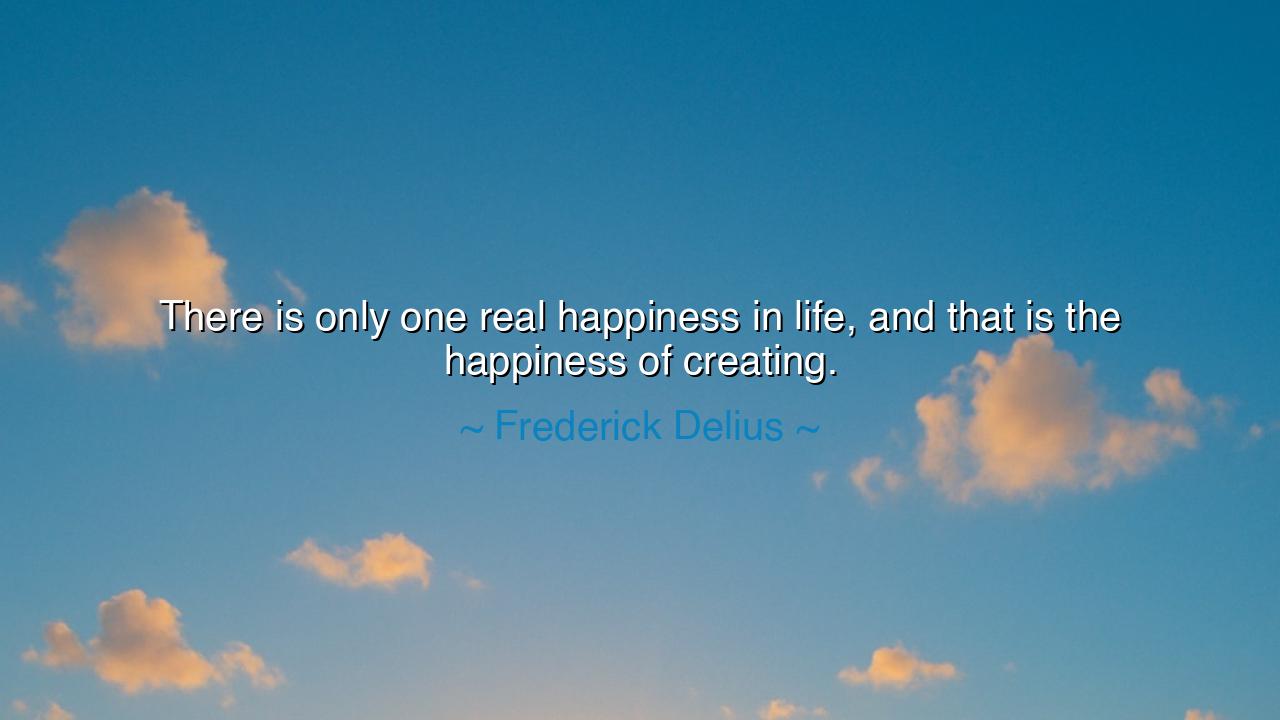
There is only one real happiness in life, and that is the






In the words of Frederick Delius, “There is only one real happiness in life, and that is the happiness of creating.” These words, like music themselves, rise from the depths of a soul that has known both the sweetness of beauty and the ache of existence. Delius, the English composer whose works seemed to breathe with the pulse of nature itself, spoke not as one who chased applause or fame, but as one who understood that the true source of happiness is found in creation — in the act of bringing forth something that did not exist before. To create is to participate in the eternal rhythm of life itself, to touch the divine mystery from which all being flows.
The origin of this quote comes from Delius’s reflections on his own life as an artist — a man whose path was anything but easy. Born into a family of merchants who sought to bind him to the safety of commerce, Delius felt the call of art burning like a secret flame within him. Against his father’s will, he abandoned the world of trade and devoted himself to music. In this act of rebellion, he discovered his destiny. He lived through years of obscurity, illness, and physical decline, yet through it all, he continued to compose. When paralysis finally struck him, leaving him unable to hold a pen, he dictated his final works to a devoted assistant. Why? Because, as he said, creating was happiness — the only happiness that mattered.
The ancients, too, understood this sacred truth. In their wisdom, they saw creation not merely as invention, but as a participation in the divine order. To the Greeks, Prometheus was the bringer of fire — the spark of creation — who defied the gods so that mankind might know art, knowledge, and progress. He was punished for his gift, yet his suffering became a symbol of human greatness. So too does Delius’s belief echo this myth: that the act of creating, though it may bring struggle and sacrifice, is the most profound joy the soul can know. For creation is the bridge between mortality and eternity — it is the soul’s rebellion against nothingness.
To create is not only to compose symphonies or paint or write; it is to shape one’s world through thought, action, and love. The mother who raises her child, the craftsman who shapes wood, the teacher who shapes minds — all partake in this sacred art. Happiness, Delius reminds us, is not found in consumption, but in production — in the making of something meaningful. The one who creates gives form to what is within, and in doing so, finds purpose. When we stop creating, we begin to decay, for the soul was not made to remain idle. Even the smallest act of creation — a poem written, a garden planted, a kindness extended — kindles the joy of existence.
Consider the story of Beethoven, who, like Delius, found joy only in creation even when life turned cruel. Deaf, isolated, and misunderstood, he could no longer hear the music of the world — yet he heard the music within. In that silence, he composed his greatest works, including the Ninth Symphony, whose triumphant “Ode to Joy” declares the unbreakable spirit of humanity. Beethoven’s life was filled with pain, but his art was filled with joy, for he had found that happiness lies not in circumstance, but in the creative act — the ability to give life to something greater than oneself.
And so Delius’s words ring with both power and humility: “There is only one real happiness in life.” For all other forms of pleasure — wealth, recognition, comfort — are fleeting and dependent upon others. But creation springs from within and cannot be taken away. It is the joy of the divine made human — the joy of shaping reality with one’s hands, heart, or imagination. When one creates, one becomes a conduit of something eternal; time falls away, and the spirit enters communion with the infinite.
The lesson, then, is as clear as it is timeless: seek happiness through creation, not possession. Do not wait for joy to find you in the form of comfort or approval; forge it yourself through your work, your art, your relationships, your dreams. Each day offers a chance to make something new — a thought, a gesture, a creation that bears your unique imprint. The act itself, not the outcome, is where joy resides.
So, O listener, remember the wisdom of Frederick Delius: to create is to live twice — once in the flesh, and once in the spirit. In the quiet labor of your own making, whether in art or in love, you will find the only happiness that endures. For in creating, you do not merely add to the world — you become one with its eternal song, joining the chorus of all who have ever dared to bring forth beauty from the silence.






AAdministratorAdministrator
Welcome, honored guests. Please leave a comment, we will respond soon